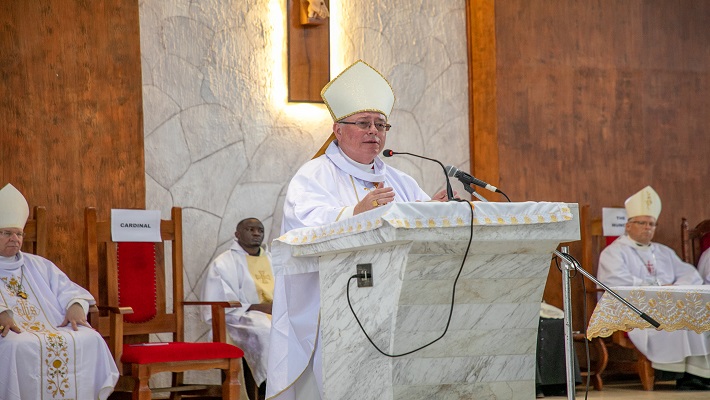By Paschal Norbert
NAIROBI, JANUARY 30, 2024 (CISA) – In a presentation entitled “Understanding the Emerging Synodal Church in the light of ‘Praedicate Evangelium’,” Cardinal Jean-Claude Hollerich, S.J., the general rapporteur of the XVI Ordinary General Assembly of the Synod of Bishops tells a meeting of African and European bishops that the new Constitution reforming the Roman Curia was necessary for the Church to rediscover itself and respond to the needs of the time.
Cardinal Hollerich who was speaking at a three-day seminar from January 23 to 26, 2024, that brought together 20 bishops from the Symposium of Episcopal Conferences of Africa and Madagascar (SECAM) and the Council of European Bishops’ Conferences (CCEE), explained “With this text, which reforms the functioning and mission of the Roman Curia, the central administration of the Church, the Pope has a clear message: in order to proclaim the Gospel to the world, the Church must first proclaim it to itself by reforming itself from within. This reform is necessary if the Church is to rediscover its nature as a synodal Church.”
The triennial meeting of the bishops from SECAM and CCEE was to deliberate on their shared responsibilities in evangelization, mission, and pastoral care in light of the current developments in the universal Church; the Apostolic Constitution “Praedicate Evangelium” and the Synodality.
The Vice President of CCEE and the Archbishop of Luxembourg highlighted that in the reforms of the Roman Curia, the pope is guided by his vision of a “missionary conversion” of the Universal Church and that he is following in the footsteps of previous apostolic constitutions – with the last being the “Pastor bonus”, which was promulgated by Pope St. John Paul II in 1988 to “promote communion in the whole organism of the Church.”
He said the new constitution, which places the Dicastery for Evangelization at the fore, is for an evangelization-focused curia and “The guiding principles of this reform are the ‘mystery of communion that unites the Church and synodality, in order to allow mutual listening between the faithful, the College of Bishops and the Bishop of Rome.’”
The member of the Council of Cardinals, the advisory body to Pope Francis, intimated that the constitution was a result of a lengthy collegial work and responded to the concerns of the cardinals raised in the pre-conclave meetings of 2013.
He advances that the reforms emphasize the “Curia’s duty to serve the communion between bishops.”
“It calls for the establishment of an “organic relationship” with the bishops and gives greater prominence to the “intermediate bodies” that are the national, regional and continental episcopal conferences, as well as the Eastern hierarchical structures. This service focuses in particular on the fight against abuses and the service of the poorest,” he details.
As an advocate for greater involvement of the laity and youth in the Universal Church, Hollerich noted that one of the strong points of the new constitution was the call for greater involvement of the laity in governance, especially in dicasteries as seen in the appointment of veteran journalist Dr Paolo Ruffini, the Prefect for the Dicastery for Communication.
“Evangelization is not just a matter for the bishops. ‘Every Christian, by virtue of baptism, is a missionary disciple’, the Pope emphasizes. By virtue of this conviction, lay people are called to occupy ‘roles of government and responsibility’ within the Curia,” He explains.
“The Pope emphasizes the ‘vicarial character of the Roman Curia’, which means that all those in charge of the Curia, whether clerics or lay people, act on a delegation from the Supreme Pontiff. ‘Any member of the faithful may preside over a dicastery or an organization’, in accordance with his or her competence and capacity for government, he adds.’”
On the Solemnity of St. Joseph, March 19, 2022, Pope Francis promulgated the new Apostolic Constitution on the Roman Curia, entitled “Praedicate Evangelium” – “Proclaim the Gospel”, which governs the Roman Curia. The new constitution replaced the Pastor Bonus promulgated by Pope John Paul II in 1988.
